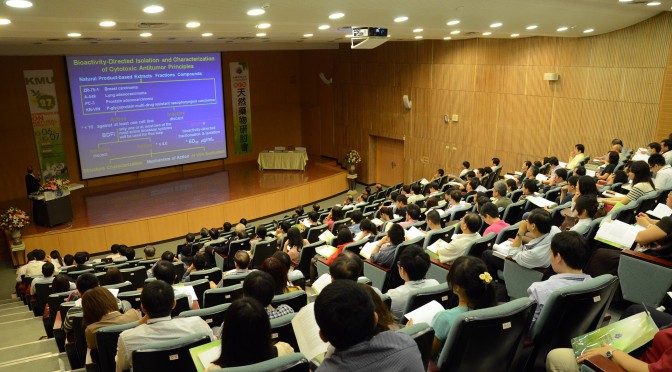Established on August 1, 1999, the College of Pharmacy, which at that time was comprised of an undergraduate department and two graduate institutes, was the first college of its kind in Taiwan. The college currently consists of the School of Pharmacy (composed of undergraduate, MS and Ph.D. programs in Pharmaceutical Sciences, In-service M.S. program and M.S. program in Clinical Pharmacy), the Department of Fragrance and Cosmetics (composed of undergraduate and MS programs), the Graduate Institute of Natural Products (compose of M.S. and Ph.D. programs), and Ph.D. program in Toxicology.
Goals
Three educational goals of the college include life-pharmacy orientation, innovation in research and development, and service with care. There are six dimensions to develop; 1) to train professionals in pharmaceutical science, clinical pharmacy, fragrance cosmetics, herbal medicine, biotechnology and toxicology; 2) to promote the academic research in TCM and natural medicine in combination with technology, and to satisfy the requirement for modernizing TCM development and safety; 3) to enhance international cooperation in education and research; 4) to enhance the cooperation between basic, clinical medicine and life sciences to augment research competitiveness; 5) to promote industry-university cooperation and aid the growth of pharmaceutical and cosmetic industries; 6) to provide quality health care in pharmacy and aesthetic medicine, and to achieve the university’s goal of excellence in teaching, innovation in research, quality in humanistic art, and care in society.
Missions
- Contemplating pharmaceutical trends, planning pharmacy courses, as well as training professionals, the manpower of the Pharmaceutical Science, Pharmaceutical Care, and Biomedicine.
- Equipping students majoring in natural products with innovative research and development capacity for outstanding performance
- Establishing standards for the study of fragrance and cosmetics
- Fostering clinical pharmaceutical professionals and developing a pharmaceutical care system
- Fostering interdisciplinary toxicological professionals as well as promoting the certification and registration program for toxicologists in Taiwan
- Promoting pharmaceutical education reform and renovating the look of pharmacy
- Passing on and rejuvenating the KMU Pharmacy heritage
Accomplishments
1. Teaching and Research
By formulating well-organized learning programs and integrated course maps as well as by fully utilizing the resources and the qualified instructors of the school and its teaching hospital, we can develop patient-oriented high-quality pharmacy training program via PBL and the OSCE evaluation method and nurture qualified pharmacists with the ability to understand clinical problems and how to care for patients.
2. Internationalization
To improve the faculty and the students’ ability to internationalize, the college has been active in promoting and encouraging all sorts of international cooperation in order to broaden the student’s perspective. The university has signed sister university agreement with 28 international colleges. Previously, the college has already had sister colleges such as the University of North Carolina, Ohio State University, and Nova Southeastern University. Recently, we have also signed memorandum and academic cooperation with the Colleges of Pharmacy of the University of Southern California, University of California San Diego, Palm Beach Atlantic University, University of Uppsala and University of Szeged. In 2012, the university signed the Ph.D. dual degree cooperation agreement with the University of Uppsala, Sweden, and the University of Szeged, Hungary.
Accomplishments
1. Teaching and Research
By formulating well-organized learning programs and integrated course maps as well as by fully utilizing the resources and the qualified instructors of the school and its teaching hospital, we can develop patient-oriented high-quality pharmacy training program via PBL and the OSCE evaluation method and nurture qualified pharmacists with the ability to understand clinical problems and how to care for patients.
2. Internationalization
To improve the faculty and the students’ ability to internationalize, the college has been active in promoting and encouraging all sorts of international cooperation in order to broaden the student’s perspective. The university has signed sister university agreement with 28 international colleges. Previously, the college has already had sister colleges such as the University of North Carolina, Ohio State University, and Nova Southeastern University. Recently, we have also signed memorandum and academic cooperation with the Colleges of Pharmacy of the University of Southern California, University of California San Diego, Palm Beach Atlantic University, University of Uppsala and University of Szeged. In 2012, the university signed the Ph.D. dual degree cooperation agreement with the University of Uppsala, Sweden, and the University of Szeged, Hungary.




